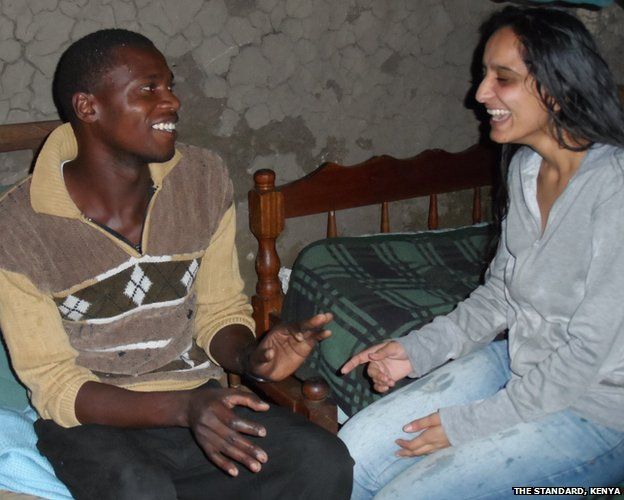#BBCtrending: The love story that's captivated Kenya
- Published

Kenyans on social media have been gripped by a love story between a Kenyan woman of Indian descent, and a man from the Bukusu ethnic group.
Kenyans on Twitter are in a distinctly lovey-dovey mood.
"A village Cinderella story," tweeted one woman. "Love beyond culture, colour, religion... simply amazing."
"This is like a movie. I can't believe what my eyes are seeing," wrote one man. And so it goes on...
Much of the discussion is on the hashtag #MyBukusuDarling, which has now been used more than 8,000 times.
The couple in question are Sarika Patel, 24, and Timothy Khamala, 25 who live in village in the Webuye area, in the west of Kenya. As well as race, there's a class element to their story. Patel is the daughter of a wealthy businessman, while Khamala is from a poor family who live in a simple mud hut.
They first met four years ago while he was washing her father's car. Sarika has just moved in with Khamala and they plan to get married, but her family are said to strongly disapprove.
"These are the kind of stories Kenyans love - they are tired of politics," says Lindah Oguttu, a news anchor at KTN Kenya, the TV station which first reported the story. "It stretches the parameters. It's a no-go zone - Indians do not marry blacks and blacks do not marry Indians," she says.
Oguttu was also the first to use the hashtag #MyBukusuDarling. An hour before the show, a number of senior editors met to discuss the top items on the programme, she says, and decided to create a special hashtag to encourage people to discuss the story. And it clearly worked.
Kenya saw serious inter-ethnic violence after the 2007 election, in which more than 1,000 people were killed. Many have interpreted the couple's love story in this light. "#MyBukusuDarling is a good example of our Kenyan dream. The Kenya we all want to live in. A Kenya of Peace Love and Unity," tweeted Phyllis Kandie, the cabinet secretary for East African Affairs, Commerce and Tourism.
There are no up-to-date figures on how many people in Kenya are of Asian or Indian descent. Some estimates put it at around 100,000 out of an overall population of 42 million.
And some are somewhat nonplussed by the attention the story has got. "What is this obsession inter-racial relationships? Why should it be headline news? We are all human beings," says Rasna Warah, a Kenyan writer of Indian descent who is herself married to black Kenyan. "We have to move beyond the race thing - either you are Kenyan or you are not."
But, it seems, cultural differences may be playing a part in the story of Patel and Khamala. In Kenya, it is traditional for a man to pay dowry to a woman. Among Kenyan Indians, it is the other way around.
According to reports in the Kenyan media, Khamala's family have opted to take the Indian approach - asking Patel's family to pay. Some on social media have criticised this as "greedy" and an "embarrassment" to Bukusu society. One man suggested a compromise: "They should respect each other's cultures, so both should pay dowry."
Reporting by Cordelia Hebblethwaite
You can follow BBC Trending on Twitter @BBCtrending
All our stories are at bbc.com/trending